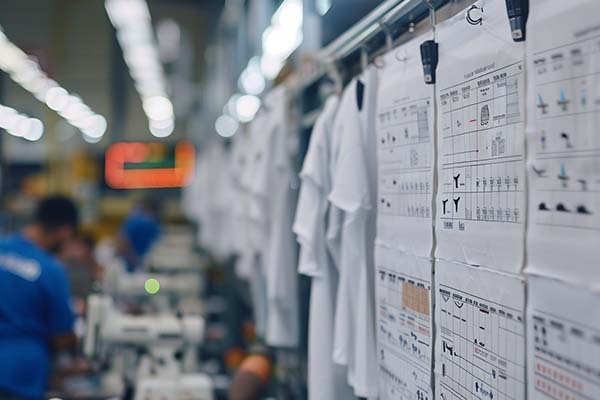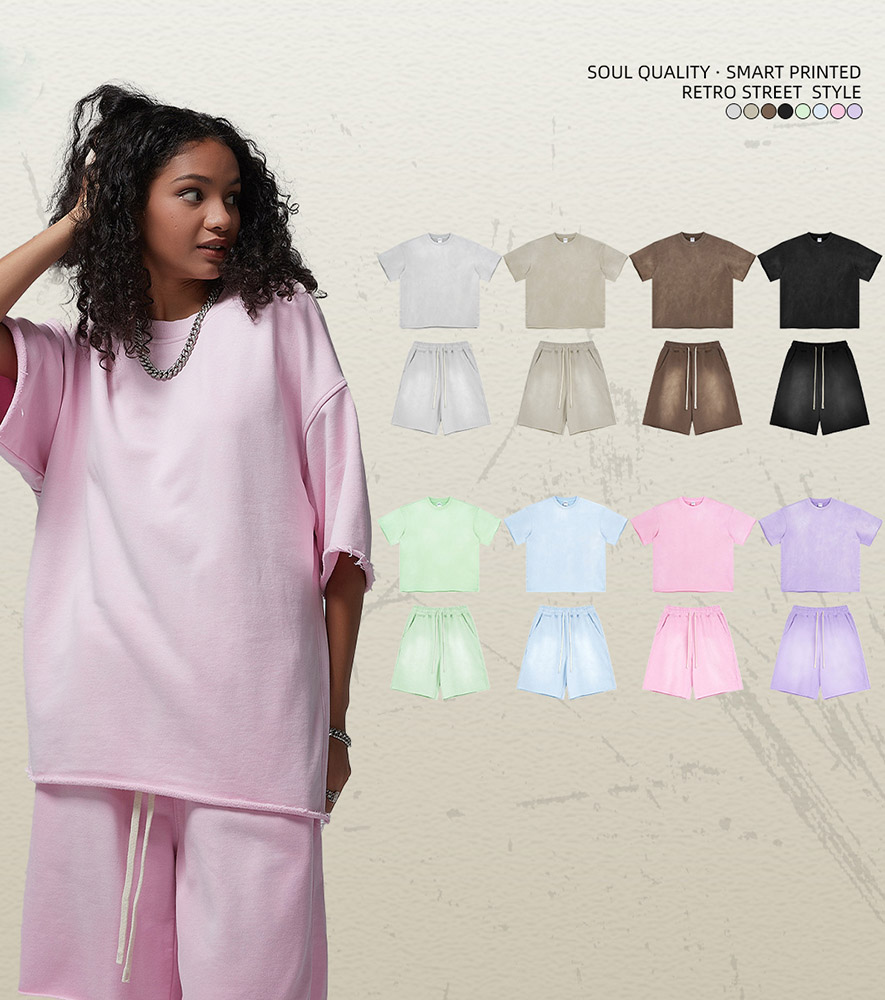Manufacturing a T-shirt seems simple, but the process involves multiple steps, from fabric selection to final stitching. Many businesses want to know how long it takes to produce T-shirts to plan their supply chain1 effectively.
The time to manufacture a T-shirt depends on fabric sourcing, production complexity, and order quantity. On average, it takes 1-4 weeks for bulk production, while custom designs or specialty fabrics may extend lead times to 6-8 weeks.
Understanding the production timeline helps businesses avoid delays and manage inventory efficiently. Let’s explore each stage of T-shirt manufacturing and factors that affect production speed.

What are the key stages in T-shirt manufacturing?
Each step in T-shirt production takes time, from sourcing materials to final packaging.
The key stages include fabric sourcing (1-3 weeks), cutting and sewing2 (1-2 weeks), printing and embroidery (2-7 days), and quality control (2-5 days). Delays in any step can extend the total production time.
Breakdown of T-shirt production timeline
| Production Stage | Time Required |
|---|---|
| Fabric sourcing | 1-3 weeks |
| Cutting and sewing | 1-2 weeks |
| Printing/embroidery | 2-7 days |
| Quality control & packaging | 2-5 days |
| Total production time | 2-6 weeks |
This timeline varies depending on factors such as order size, customization, and supplier efficiency.
How long does fabric sourcing take?
Fabric sourcing is one of the most time-consuming steps in T-shirt production.
Fabric sourcing typically takes 1-3 weeks, depending on availability and location. Locally sourced fabrics are faster, while imported materials can extend the timeline by several weeks.
Factors affecting fabric sourcing time
- Availability – Common fabrics like cotton or polyester are readily available, while specialty fabrics (organic cotton, bamboo, modal) may take longer to source.
- Supplier location – Local sourcing is quicker than importing materials from another country.
- Customization – Custom-dyed fabrics or special treatments (moisture-wicking, antibacterial) require extra processing time.
To speed up production, businesses should confirm fabric availability before placing an order.
How long does cutting and sewing take?
After sourcing materials, the fabric must be cut and stitched into T-shirts.
Cutting and sewing usually take 1-2 weeks for bulk production. The speed depends on factory capacity, order size, and complexity of design.

How complexity affects sewing time
| T-shirt Type | Production Time |
|---|---|
| Basic cotton T-shirt | 1 week |
| Custom fit/design T-shirt | 1-2 weeks |
| Multi-panel or detailed stitching | 2+ weeks |
Factories with automated cutting machines and skilled workers can produce T-shirts faster, while smaller workshops may take longer.
How long do printing and embroidery take?
Printing or embroidery adds extra time to production, especially for custom designs.
Printing takes 2-5 days, while embroidery can take up to 7 days, depending on design complexity and order size.
Comparison of different printing techniques
| Printing Method | Speed | Best For |
|---|---|---|
| Screen printing3 | 2-4 days | Bulk orders, durable prints |
| DTG (Direct-to-Garment)4 | 1-3 days | Small orders, detailed designs |
| Heat transfer | 2-4 days | Fast, but less durable |
| Embroidery | 5-7 days | Premium logos, durable finish |
Larger orders with multiple colors or complex designs require extra time. Some factories run printing and embroidery parallel to sewing to save time.
How long does quality control and packaging take?
Once T-shirts are sewn and printed, they undergo final checks before shipping.
Quality control and packaging take 2-5 days, depending on the factory’s efficiency and order size.

Steps in quality control
- Fabric inspection – Checking for defects like uneven dye or holes
- Stitching check – Ensuring seams are strong and consistent
- Printing/embroidery check – Verifying design accuracy
- Packaging – Folding, tagging, and boxing T-shirts for shipment
Strict quality control prevents returns and defects, but it can slow down production if many errors are found.
What factors affect T-shirt production speed?
Several external factors can impact the total production time.
Key factors include factory capacity, order size, customization level, and supplier efficiency. Unexpected delays in material availability or labor shortages can also slow down production.
How order size impacts production time
| Order Size | Estimated Time |
|---|---|
| Small batch (100-500 pcs) | 1-2 weeks |
| Medium order (1,000-5,000 pcs) | 2-4 weeks |
| Large bulk order (10,000+ pcs) | 4-6 weeks |
Larger factories can handle bulk orders faster, while small-scale suppliers may need extra time.
The impact of customization on production speed
Customization requires additional steps, extending production time.
| Customization Type | Extra Time Added |
|---|---|
| Special fabric sourcing | +1-3 weeks |
| Custom labels/tags | +3-7 days |
| Unique dyeing process | +1-2 weeks |
If speed is a priority, choosing ready-made fabrics and simpler designs can shorten lead times.
How can businesses speed up T-shirt production?
To reduce lead times, businesses should take proactive steps in supplier selection and production planning.
Businesses can speed up T-shirt production by selecting reliable suppliers, confirming fabric availability early, placing Bulk orders5, and simplifying designs. Clear communication with the factory also prevents delays.
Strategies to speed up production
- Work with experienced suppliers – Factories with strong infrastructure produce faster.
- Use in-stock fabrics – Custom fabrics take extra time.
- Plan ahead for peak seasons – High-demand periods slow down production.
- Confirm design details early – Last-minute changes cause delays.
- Choose efficient printing methods – DTG or heat transfer is faster than screen printing.
By optimizing these factors, businesses can ensure timely delivery without sacrificing quality.
Conclusion
T-shirt manufacturing takes 1-4 weeks on average, with factors like fabric sourcing, printing, and order size influencing total production time. For simple T-shirts, production can be as fast as one week, but custom designs and bulk orders may extend lead times to 6-8 weeks. Planning ahead and working with efficient suppliers ensures a smooth production process.
-
Gives strategies for efficient material sourcing and timely deliveries. ↩
-
Explains robotic cutters and specialized machines improving production efficiency. ↩
-
Shows cost-effectiveness for large orders with durable print results. ↩
-
Offers insights on advanced machines and their high-quality capabilities. ↩
-
Highlights volume discounts and streamlined processes for large-scale runs. ↩













